 Petzlover
Petzlover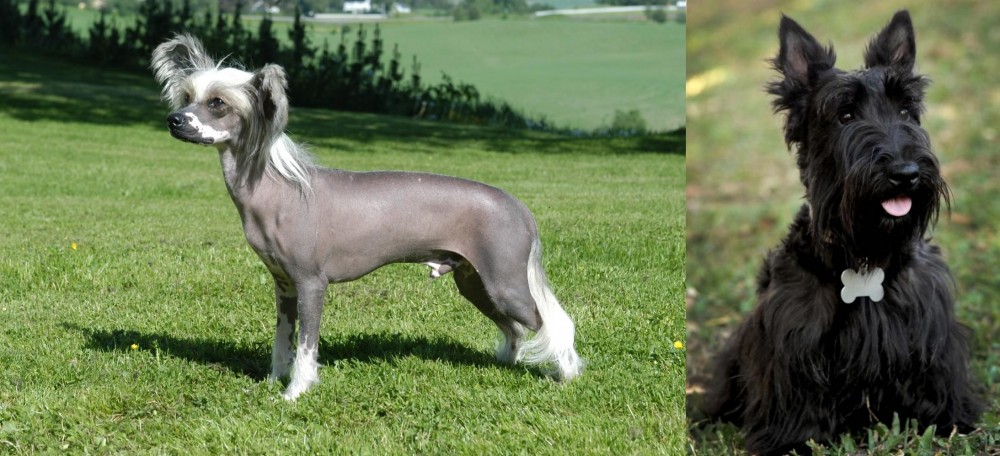 Chinese Crested Dog is originated from Mexico but Scoland Terrier is originated from United Kingdom. Both Chinese Crested Dog and Scoland Terrier are having almost same height. Both Chinese Crested Dog and Scoland Terrier are having almost same weight. Both Chinese Crested Dog and Scoland Terrier has almost same life span. Both Chinese Crested Dog and Scoland Terrier has almost same litter size. Chinese Crested Dog requires Low Maintenance. But Scoland Terrier requires High Maintenance
Chinese Crested Dog is originated from Mexico but Scoland Terrier is originated from United Kingdom. Both Chinese Crested Dog and Scoland Terrier are having almost same height. Both Chinese Crested Dog and Scoland Terrier are having almost same weight. Both Chinese Crested Dog and Scoland Terrier has almost same life span. Both Chinese Crested Dog and Scoland Terrier has almost same litter size. Chinese Crested Dog requires Low Maintenance. But Scoland Terrier requires High Maintenance
 The Chinese Crested Dog is believed to have its origins in Africa and there are many texts from the 19th Century that feature an Africa Hairless Terrier that resembles the Chinese Crested. However, the scientific and genetic evidence leads to an origin that is shared with the Mexican Hairless Dog. Any way you look at it the dog did not originate in China. The Chinese were very fond of this breed and used them on their ships to control the rat populations. This is probably how they got their name.
The Chinese Crested Dog is believed to have its origins in Africa and there are many texts from the 19th Century that feature an Africa Hairless Terrier that resembles the Chinese Crested. However, the scientific and genetic evidence leads to an origin that is shared with the Mexican Hairless Dog. Any way you look at it the dog did not originate in China. The Chinese were very fond of this breed and used them on their ships to control the rat populations. This is probably how they got their name.
There are two types of Chinese Crested Dogs – the well known Hairless, and the lesser known Powderpuff. The Hairless type is better known because they carry the dominant trait and the Powderpuff is recessive. However, this recessive gene is carried by every Chinese Crested Dog so the Powderpuff can show up in all litters even those of two Hairless Crested. Two Powderpuffs will not result in any Hairless in their litters as the Powderpuff does not have the gene for the Hairless.
The “Crest Haven” Kennel was opened by Debora Wood in the 1950’s to breed the Chines Crested Dog. At the same time Gypsy Rose Lee, of the famous burlesque shows, was also breeding Chinese Crested Dogs. The two lines of Crested bred by Americans came together following the death of Rose Lee. Every Chinese Crested that lives today can trace their heritage directly to these two breeding lines. In 1959, Debra Wood founded the American Hairless Dog Club which became a part of the American Chinese Crested Club or the ACCC in 1978. This organization then became the breed’s parent club after AKC (American Kennel Club) recognized the breed in 1991. Prior to this the Federation Cynologique Internationale, recognized the breed in 1987, the United Kingdom (UK)the Kennel Club recognized them in 1981 and the Australian National Kennel Council recognized the Crested in 1995.
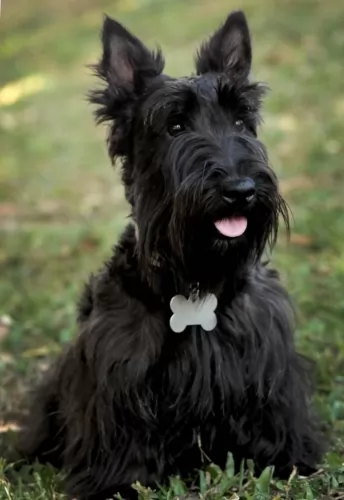 Not much is known about the Scoland Terrier. It is not a purebred but rather a crossbreed developed by crossing the Scottish Terrier with the Westland Terrier. To understand these mixed breeds, look to the original breeds for any combination of the characteristics of the breeds. The offspring of this crossing is not a 50-50 split of the original breeds looks or temperament.
Not much is known about the Scoland Terrier. It is not a purebred but rather a crossbreed developed by crossing the Scottish Terrier with the Westland Terrier. To understand these mixed breeds, look to the original breeds for any combination of the characteristics of the breeds. The offspring of this crossing is not a 50-50 split of the original breeds looks or temperament.
Because the Scoland Terrier is a mix between the Scottie and the Westie he has all the characteristics of a typical terrier perhaps even twice as much. With both parents being terriers, you can expect your Scoland to act like a short legged terrier. These dogs are known for their courage and tenacity. Today these terriers are family companions. Most terriers today come from a pool of ancestral dog in the 19th century in Europe. This information was gleaned from a genetic analysis done in 2006.
The Scoland Terrier, being a hybrid, is not acknowledged by the American Kennel Club (AKC) or the United Kennel Club (UKC). It is acknowledged by the International Designer Canine Registry (IDCR), American Canine Hybrid Club (ACHC), Dog Registry of America, Inc. (DRA), Designer Dogs Kennel Club (DDKC) and Designer Breed Registry (DBR).
 This is a toy breed and very small. The Hairless and the Powderpuff are two types of the same breed, although they do not look like it. The Hairless type can have fur anywhere on its body, but it will not have much. It will have hair on its paws, tail and head. The Powderpuff on the other hand will have a thick double coat. When discussing the color of the hairless, one is referring to the color of its skin. It can range from flesh to black.
This is a toy breed and very small. The Hairless and the Powderpuff are two types of the same breed, although they do not look like it. The Hairless type can have fur anywhere on its body, but it will not have much. It will have hair on its paws, tail and head. The Powderpuff on the other hand will have a thick double coat. When discussing the color of the hairless, one is referring to the color of its skin. It can range from flesh to black.
The Powderpuff has a soft, thick, straight double coat. It can have very long hair. The Hairless must have its skin taken care of and protected. Both types of Chines Crested are small in stature with well proportioned, athletic bodies.
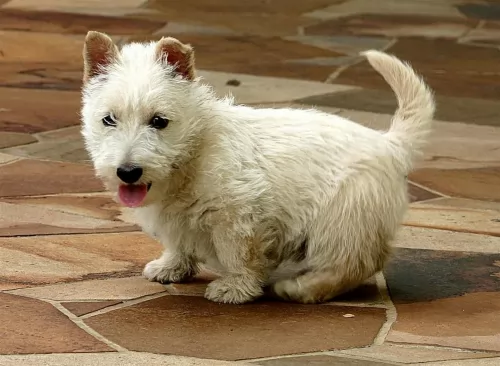 Being a hybrid, the Scoland Terrier will not always look alike and could look like a Scottie, a Westie or a combination of the two. Most breeders of this designer dog say it usually has a body like the Scottie and a round head like the Westie. They are more often black with white markings, but they can often be wheaten as well. With round dark eyes, a scissors bite and black nose, her face is unique. The breed has erect and small, triangular ears and a medium fluffy tale. The coat is hard and wiry, with a dense soft undercoat.
Being a hybrid, the Scoland Terrier will not always look alike and could look like a Scottie, a Westie or a combination of the two. Most breeders of this designer dog say it usually has a body like the Scottie and a round head like the Westie. They are more often black with white markings, but they can often be wheaten as well. With round dark eyes, a scissors bite and black nose, her face is unique. The breed has erect and small, triangular ears and a medium fluffy tale. The coat is hard and wiry, with a dense soft undercoat.
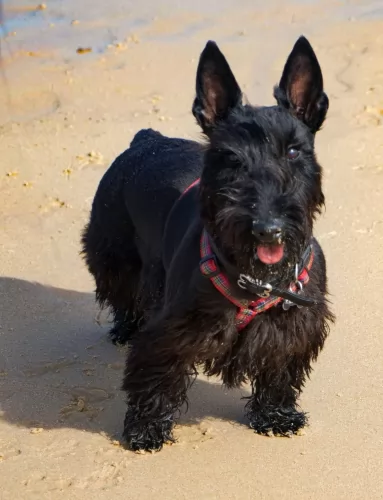 1.Children friendliness - they can be very good with children and children can help them get their exercise.
1.Children friendliness - they can be very good with children and children can help them get their exercise.
3.Adaptability - yes but she is adept at digging and must have a safe enclosure.
 The Chinese Crested Hairless version must have its skin take care of much in the same way we take care of our own. It will burn if exposed to too much sun without protection. They can suffer from dry skin, acne, need moisturizing cremes. They get skin allergies as well and it is important to take care of the skin instead of the brushing you don’t have to do.
The Chinese Crested Hairless version must have its skin take care of much in the same way we take care of our own. It will burn if exposed to too much sun without protection. They can suffer from dry skin, acne, need moisturizing cremes. They get skin allergies as well and it is important to take care of the skin instead of the brushing you don’t have to do.
The Chinese Crested does not suffer from most of the diseases other toy breeds do. They can have ye issues. The Hairless have a “primitive mouth” . They have pointy teeth and poor dentition. This is not true of the Powderpuffs however. Their eye issues include:
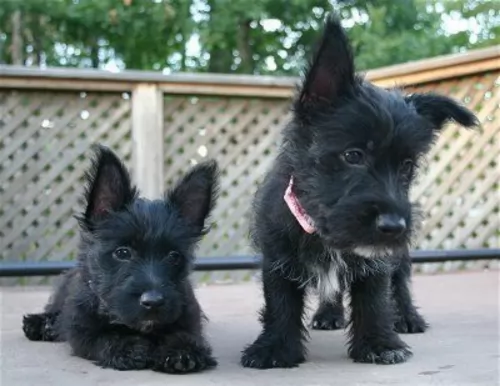 This hybrid dog can inherit any of the issues faced by its two parent breeds. For the Scoland Terrier this can include:
This hybrid dog can inherit any of the issues faced by its two parent breeds. For the Scoland Terrier this can include:
• Seborrhea – Skin disease that can cause dogs to scratch until bleeding and/or infected.
• Carniomandibular Osteopathy -called lion’s jaw this is a developmental disease that causes extensive changes in the bones of the mandible and skull.
• Pulmonic Stenosis – when the blood flowing from the heart’s right ventricul to the pulmonary artery is blocked.
• PPM or Persistent Pupillary Membranes - causes visual impairment when the membranes do not dissolve after birth.
• Chronic Hepatitis – disease of the liver that can eventually cause major damage.
 Like several other toy breeds, it is easy to overfeed the Chinese Crested because it has such a small stature. Feed once or twice a day but never more than one fourth of a cup total for the day.
Like several other toy breeds, it is easy to overfeed the Chinese Crested because it has such a small stature. Feed once or twice a day but never more than one fourth of a cup total for the day.
Luxating Patellas – kneecaps move out of place and cause lameness and arthritis
Legg-Perthes Disease – a hip disorder where blood does not reach the head of the femur. The bone dies, and growth stops.
Canine Multiple System Degeneration (CMSD) – a progressive movement disorder can call falls
This Breed does not need an excessive amount of exercise, but they do enjoy running. They are competitive and athletic, so they can excel at flyball, lure coursing, agility and obedience. They are sensitive and trainable enough to become a therapy dog.
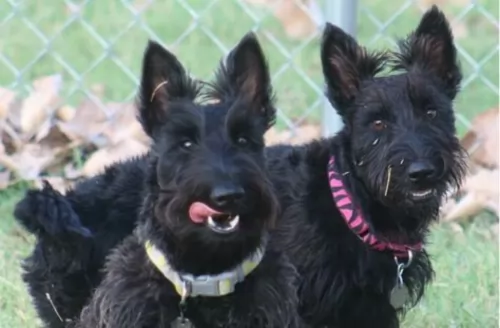 1.Feeding the puppy - Give a high quality puppy dog food designed for terriers or active medium sized dogs. Give ¾ of a cup over 3 meals a day.
1.Feeding the puppy - Give a high quality puppy dog food designed for terriers or active medium sized dogs. Give ¾ of a cup over 3 meals a day.
2.Feeding the adult – Give a high quality adult dog food designed for terriers or active medium sized dogs. Give one cup over two meals a day.
4. Games and Exercises – The Scoland Terrier is a very active dog and needs daily exercise, He need time to play, run, and be stimulated by games. She would be very good at flyball, Frisbee, fetch, agility, barn hunt, and obedience. He needs at least 2 hours of play and exercise everyday.